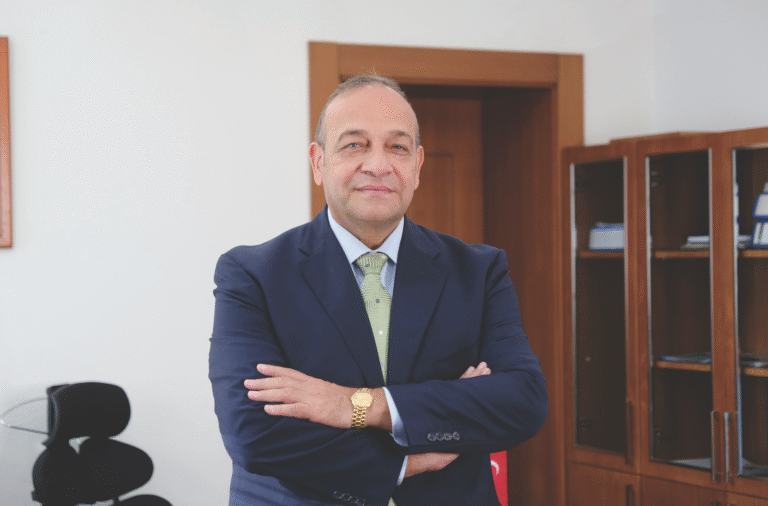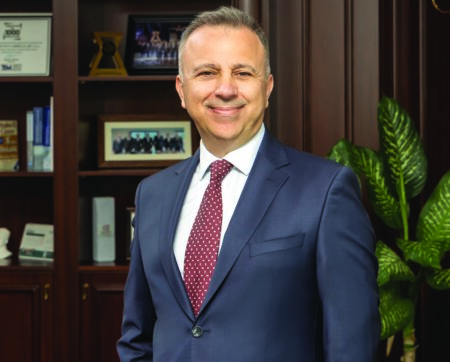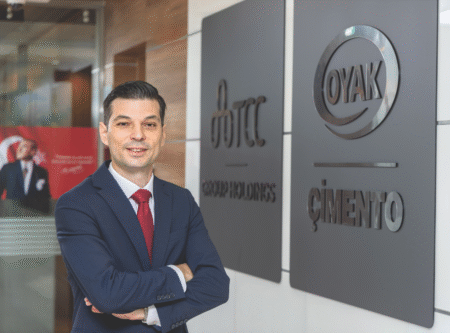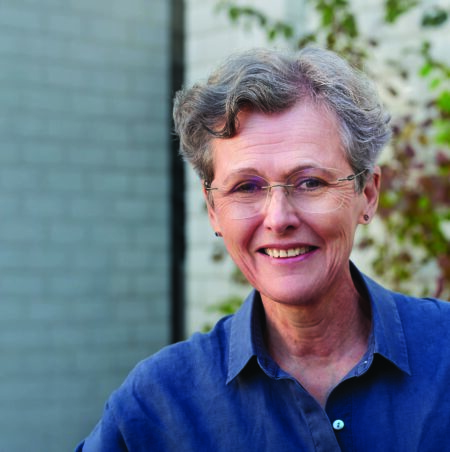Barbaros Onulay
General Manager Bursa Çimento Fabrikası A.Ş.
Bursa Çimento has achieved a 15% reduction in greenhouse gas emissions through its new modernization project. Since 2011, the company has converted 590,000 tons of waste into energy at its Waste-Derived Fuel (WDF) Facility, reducing environmental impact while making a significant contribution to the circular economy. With its modernization investment, Bursa Çimento aims to increase the use of alternative fuels to 80%. This transformation, supported by concrete actions and quantitative data, positions Bursa Çimento as a leading player investing in a green future both in Türkiye and in the global market.
How do you evaluate Bursa Çimento’s position in the Turkish and global markets? How do your mission and vision shape this positioning?
Today, we are positioned as a reliable, innovative, and preferred manufacturer both in Türkiye and in international markets. In addition to being a regional power, we also aim to strengthen our presence on a global scale through our commitment to sustainable production and long-term collaborations.
In line with our mission, we prioritize stakeholder satisfaction by adopting innovative and efficient production techniques that ensure sustainability, while also creating social and economic value. This approach not only reinforces our strong position in both local and global markets but also establishes us as one of the leading and most trusted players in the industry.
Our vision is to build a sustainable future on both local and global scales by upholding environmental values and integrating innovative technologies. This vision strengthens our leadership in Türkiye, while positioning us in international markets as a competitive, responsible, and future-oriented company.
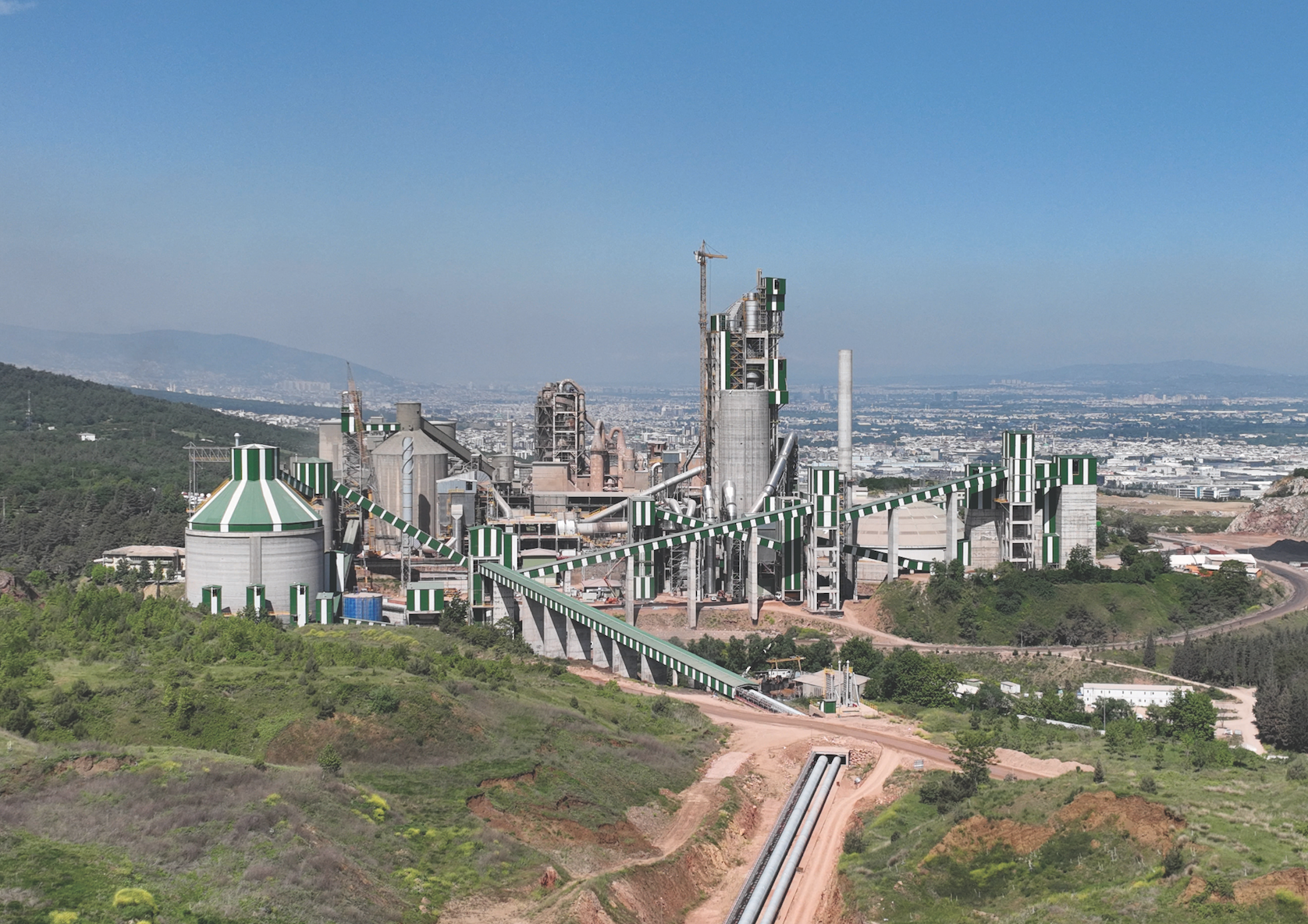
Our product development and R&D activities constitute one of the most critical pillars of our sustainable production vision.
Could you briefly summarize Bursa Çimento’s approach to sustainability? What concrete steps is your company taking to reduce its environmental impact?
As Bursa Çimento, operating since 1966, we leverage the experience of our long-standing industrial background to make a strong start in our sustainability journey. We position ourselves not only as a cement producer but also as a key actor in Bursa, recognized for our social and environmental impact.
At the heart of our sustainability strategy lies the integration of social, environmental, and governance dimensions into our business processes, alongside operational efficiency and production targets. This approach is not merely an effort to align with global trends, but also a necessity shaped by our position in Bursa, our close interaction with the city, and the expectations of our stakeholders.
The environmental challenges we face today encourage us to act with greater sensitivity, innovation, and determination. In this context, we have taken significant steps in areas such as energy management, emission control, waste management, and the use of alternative fuels. By increasing the use of renewable energy sources in our production processes, we aim to reduce our carbon footprint. At the same time, we contribute to the circular economy by promoting waste recovery.
Not only environmental, but also social sustainability is a priority for us. Ensuring the health and safety of our employees, investing in their development, and creating a workplace that respects human rights are cornerstones of our sustainability strategy. Beyond our employees, we also continue to create value for society by fostering strong relationships with our business partners and the communities in which we operate.
Beyond our employees, we also continue to create value for society by fostering strong relationships with our business partners and the communities in which we operate.
With our first sustainability report, we are proud to share this journey with our stakeholders in a transparent, accountable, and sincere manner.
How are the new technologies implemented through the modernization project contributing to your production processes? How do these technologies impact energy management and environmental performance?
The cement industry is inherently energy-intensive. Therefore, reducing environmental impact is one of our core responsibilities. In this context, we convert industrial waste into energy to reduce fossil fuel usage and provide sustainable solutions for waste disposal. Since the commissioning of our WDF (Waste-Derived Fuel) Preparation Plant in 2011, we have converted 590,000 tons of waste into energy. Additionally, with our modernization investment, which targets up to 80% alternative fuel utilization, we aim to achieve more effective emission control.
What kind of work do you carry out in product development and R&D? How does your organizational structure in this area contribute to your innovation capacity and the added value you provide to the sector?
Our product development and R&D activities constitute one of the most critical pillars of our sustainable production vision. In cement production, emissions primarily originate from two sources: process emissions resulting from the chemical transformation of raw materials, and fuel-related emissions from the kilns.
Accordingly, we focus on blended cements with reduced clinker content to lower process emissions. As a result of these efforts, our CEMPRO-branded product, containing up to 20% mineral additives, provides the industry with an environmentally friendly and innovative solution by achieving approximately a 5% reduction in greenhouse gas emissions in cement production compared to the previous year.
To reduce fuel-related emissions, we continue feasibility studies on zero-carbon energy alternatives such as biomass and green hydrogen. Moreover, our ISO 50001 certifications—an international benchmark for energy management—and the awards we have received reinforce our commitment in this field.
Furthermore, through the investments and transformation projects we have implemented, our company has developed a framework to comprehensively analyse and transparently monitor the environmental (air quality, energy consumption, waste management, water usage, biodiversity), social (employee health and safety, community engagement, human rights, supply chain responsibility), and economic (employment, contribution to the local economy, innovation) impacts of our operations.
This approach strengthens our R&D and innovation capacity not only in product development but also in creating sustainable value and leading the sector.
How does Bursa Çimento approach employee engagement, occupational safety, and corporate culture? What initiatives do you have in place to attract the next generation of engineers and specialists?
At Bursa Çimento, our approach to employee engagement, occupational safety, and corporate culture is centered on our commitment to “respect for people and the environment.” Our Modernization Investment Project not only contributes to environmental sustainability and economic efficiency but also creates a safer, more productive, and innovative working environment for our employees. Through this project, we are elevating safety standards and establishing a production infrastructure equipped with nextgeneration technologies.
To enhance employee engagement, we prioritize transparent communication, continuous development, and a culture of shared success. In this context, we are building a corporate culture that emphasizes safety and sustainability, supporting our employees to act with awareness not only of operational processes but also of the company’s long-term future.
Furthermore, to attract the next generation of engineers and specialists, we implement university partnerships, internship programs, and talent development initiatives.
Our sustainability investments, such as the alternative fuel preparation plant, and our modernization process provide young engineers with a high-tech learning environment, enabling them to develop their skills. Thus, we aim to nurture a new generation of environmentally conscious professionals who can develop innovative solutions for both the sector and our country.
Finally, could you briefly share your career journey with us?
I graduated from Anadolu University, Faculty of Engineering and Architecture, Department of Mining Engineering. I began my professional career in 1985 with the Kınık Tunnel Project in Ankara, working in the construction sector. Between 1990 and 2003, I worked at Set Çimento, and from 2003 to 2019, I held senior management roles in mining, logistics, and supply chain at Vicat Tamtaş A.Ş. and Aktaş Sanayi ve Ticaret Şirketi.
Between 2013 and 2015, I served as Chairman of the Board of the Aggregate Producers Association, and I continue to contribute to the sector as a Board Member of the same association.
Our sustainability investments, such as the alternative fuel preparation plant, and our modernization process provide young engineers with a high-tech learning environment, enabling them to develop their skills.
After gaining extensive managerial experience in the cement, aggregate, industrial waste, and ready-mix concrete sectors, I joined Bursa Beton A.Ş. as General Manager in 2019. In addition, I hold Board Memberships at Bursa Beton A.Ş. subsidiaries—including Bursa Agrega A.Ş., Bursa Lojistik Taşımacılık A.Ş., Bursa Group Sigorta A.Ş.—as well as at ARES Environment and Energy Technologies A.Ş.
I was appointed Acting General Manager of Bursa Çimento Fabrikası A.Ş. in January 2024 and officially assumed the position in March 2024, a role I continue to hold.
As of October 1, 2025, in addition to my current responsibilities, I have been appointed as Deputy General Coordinator of Bursa Çimento A.Ş. and its affiliates.
Throughout my career, alongside my management responsibilities, I have been actively involved in business development, risk management, process performance management, strategic planning, and procurement.
Son olarak bizlere kısaca kariyer yolculuğunuzdan bahsedebilir misiniz?
Anadolu Üniversitesi Mühendislik-Mimarlık Fakültesi Maden Mühendisliği Bölümü’nden mezun oldum. Profesyonel kariyerime 1985 yılında Ankara’daki Kınık Tüneli Projesi ile inşaat sektöründe başladım. 1990-2003 yılları arasında Set Çimento, 2003-2019 yılları arasında Vicat Tamtaş A.Ş. ve Aktaş Sanayi ve Ticaret Şirketi’nde maden, lojistik ve tedarik zinciri alanlarında üst düzey yöneticilik görevlerinde bulundum.
2013-2015 yılları arasında Agrega Üreticileri Birliği Yönetim Kurulu Başkanlığı görevini üstlendim. Halen aynı birliğin Yönetim Kurulu Üyesi olarak sektörel çalışmalara katkı sağlamaktayım.
Çimento, agrega, endüstriyel atık ve hazır beton sektörlerinde edindiğim yöneticilik deneyimlerinin ardından, 2019 yılı itibariyle Bursa Beton A.Ş.’de Genel Müdür olarak göreve başladım. Bunun yanı sıra, Bursa Beton A.Ş. iştirakleri olan Bursa Agrega A.Ş., Bursa Lojistik Taşımacılık A.Ş., Bursa Group Sigorta A.Ş. ile ayrıca ARES Çevre ve Enerji Teknolojileri A.Ş.’de Yönetim Kurulu Üyeliği görevlerini yürütmekteyim.
Alternatif yakıt hazırlama tesisi gibi sürdürülebilirlik yatırımlarımız ve modernizasyon sürecimiz, genç mühendislerin kendilerini geliştirebileceği ileri teknoloji bir öğrenme ortamı sunuyor.
Ocak 2024’te vekaleten atandığım Bursa Çimento Fabrikası A.Ş. Genel Müdür pozisyonuna ise Mart 2024 itibariyle asaleten atanmış olup, görevime halen devam etmekteyim.
Ayrıca, 1 Ekim 2025 tarihi itibarıyla mevcut görevlerime ek olarak, Bursa Çimento A.Ş ve İştirakleri Genel Koordinatör Yardımcılığı görevine atanmış bulunuyorum.
Profesyonel kariyerim boyunca üstlendiğim yöneticilik görevlerinin yanı sıra; iş geliştirme, risk yönetimi, süreç performans yönetimi, stratejik planlama ve satın alma alanlarında da aktif olarak çalışmalar gerçekleştirdim.


